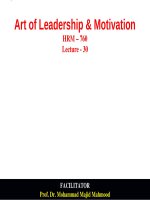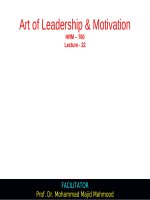Lecture Art of Leadership and Motivation - Lecture 10
Bạn đang xem bản rút gọn của tài liệu. Xem và tải ngay bản đầy đủ của tài liệu tại đây (1 MB, 34 trang )
Art of Leadership & Motivation
HRM – 760
Lecture 10
FACILITATOR
Prof. Dr. Mohammad Majid Mahmood
Critical Thinking –
a critical skill for effective leaders
Your Thinking
can either
Trap
You
hold you
hostage within
uncritically
held
beliefs
Free
You
Open your
mind
to new ways
of thinking
Who SHOULD think critically?
Who SHOULD think critically?
Who Are You?
You are…
Qualifications
& Experience
Values &
Passions
Talents
&
Skills
Personality &
Preferences
And more……
“Imagination is
more important
than knowledge”
Einstein
Thinking Outside the Box: Einstein
If you think you can,
you can
If you think you can't
you can`t
Can you make the following line
smaller without touching it:
____________
____________
___________________________
Everything we know,
believe, want, fear and hope
for, our thinking tells us.
Thinking tells us:
•
•
•
•
•
•
•
•
•
•
•
what is happening
what our problems are
what our options are
what threatens us
what is important
what is unimportant
who our friends are
who our enemies are
what our “history” is
who we are
who loves us
Thinking determines:
•
•
•
•
•
•
•
•
•
what we learn
how we learn
what we think is important to learn
what effort we should expand
what we think is true
what we think is false
how things should be viewed
whether our learning is of high or low quality
whether our learning is deep or superficial
Thinking examples
If I think that I don’t need a college degree to get a good
job, I will feel satisfied with a high school education.
Therefore I will not pursue higher education.
If I feel humiliated in the classroom because I think I
have been treated unfairly by the teacher, I will avoid
actively participating in group discussions
Thinking examples
If I think that learning should be easy, I will feel frustrated
when it is difficult. Therefore I will avoid difficult learning
situations
If I value what I am learning, I think that it is relevant to
my life. Therefore I will feel excited about learning
Why Critical Thinking?
“It is human irrationality, not a lack of
knowledge that threatens human potential”
(Nickerson, 1986)
Definitions of Critical Thinking
In “everyday” language:
• Thinking “outside” the box
• Thinking about thinking
• “Unlimited” thinking
• Different thinking
TH
IN
K
IN
G
Thinking Critically means…
• Examining different viewpoints
• Learn to think from different perspectives.
• View those opinions which differ from
yours.
• Avoid automatic responses.
Definition of Critical Thinking
...the ability to analyze facts, generate and
organize ideas, defend opinions, make
comparisons, draw inferences, evaluate
arguments and solve problems.
(Chance,1986, p. 6)
Chance, P. (1986). Thinking in the classroom: A survey of programs. New York:
Teachers College, Columbia University.
Definitions of Critical Thinking
• “reasonable reflective thinking that is focused on deciding
what to do and what to believe”
OR
• “interpreting, analyzing or evaluating information, arguments
or experiences”
OR
• “examining the thinking of others to improve our own”
Ennis, R. (1992). Critical thinking: What is it? Proceedings of the FortyEighth Annual Meeting
of the Philosophy of Education Society Denver, Colorado, March 2730.
Critical Thinking
• In undertaking your critical thinking, you should be:
– Persistent and careful and do not jump to conclusions
– Look for the grounds that support a belief or position:
• Reasons
– Be aware of the further conclusions to which it tends:
• Implications
Critical Thinking helps
•
•
•
•
•
To recognize propaganda
To analyze hidden assumptions in arguments
To recognize deliberate deception
To assess credibility of information
To work through problems/decisions in the best
way
Harpern, 1996
We don’t achieve excellence in
thinking with no end in view.









